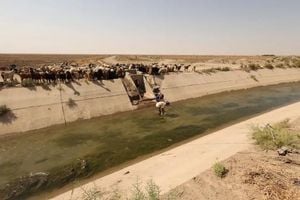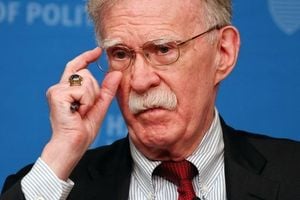The Libertadores de America stadium in Buenos Aires became the center of international attention on August 21, 2025, when a Copa Sudamericana clash between Argentina’s Independiente and Chile’s Universidad de Chile descended into chaos. What was supposed to be a pivotal second-leg encounter in South America’s fiercely contested regional tournament instead ended with the match abandoned after just 48 minutes, scores of injuries, and over a hundred arrests. The fallout is still reverberating across the football world, raising urgent questions about stadium security, fan behavior, and the responsibilities of football authorities.
It all began as a highly anticipated showdown. Universidad de Chile, having taken a slender 1-0 lead from the first leg, arrived in Buenos Aires hoping to hold off the seven-time Copa Libertadores champions, Independiente. But the football soon became secondary as violence erupted in the stands, cutting the match short and leaving the stadium littered with the debris of a night gone horribly wrong.
According to Buenos Aires provincial officials, the violence broke out shortly after halftime. The score was tied at 1-1 when the referee suspended play in the 48th minute. What followed was a scene described by witnesses as "barbaric." Fans hurled objects—including a stun grenade, rocks, pieces of iron, and even bullet casings—across the stadium. The away section, where Universidad de Chile supporters were gathered, became ground zero for the clashes. Home supporters stormed the area, beating and stripping some Chilean fans of their clothes, with one Chilean supporter forced to leap from the stands to escape. Miraculously, a roof below cushioned his fall, saving his life.
“They beat me with clubs and iron bars in the stands, they stole everything from me," recounted Ignacio Castro, a 38-year-old Chilean psychologist, outside the Chilean consulate in Buenos Aires, his face still bruised from the ordeal. "When I went down to get help from the police, they took me to the hospital, stitched me up and then arrested me," he told AFP. Castro’s story was just one among dozens, as at least 20 people were reported injured, with two in serious condition requiring surgery—one for a head injury and another for a cervical fracture. Local authorities also confirmed that one person was left in critical condition following the melee.
The violence led to a massive police response. More than 100 Chilean fans were arrested, with the final tally reaching 125, according to Argentine officials. By August 23, 2025, 104 Chileans had been released and provided with temporary travel documents so they could return home. Many had been stripped of their documents during the chaos. The stadium itself bore the scars of the night: blood stains in the stands, ripped-out drywall, torn seats, and forensic investigators combing through the debris. The stadium was promptly closed by court order while authorities launched a sweeping investigation.
“The prosecutor requested the closure because there are blood stains in the stands and forensic investigations are still pending,” explained Javier Alonso, the Security Minister of Buenos Aires, during a radio interview. He didn’t mince words about the failures that contributed to the disaster, stating, “There are people who have to be held accountable because there was a security company that was supposed to be there, and wasn’t.” He predicted “some 20 legal cases” would likely follow, as the authorities began to sift through the evidence and determine responsibility.
The incident set off a firestorm in both Argentina and Chile. Chilean President Gabriel Boric was quick to condemn the violence, telling reporters, "I think it is reasonable ... to file a complaint against the people who carried out this kind of aggression." He also pointedly criticized event organizers for their handling of the match. Chile’s Interior Minister Alvaro Elizalde echoed these sentiments outside the hospital where the most seriously injured Chileans were being treated: “Nothing justified the barbarity or the lynching that occurred.”
Chile’s ambassador to Argentina, Jose Antonio Viera-Gallo, confirmed to local radio that there were "stab wounds" among the injured, though the nationalities of all victims were not immediately clear. As the dust settled, both clubs issued statements condemning the violence. Independiente’s president, Nestor Grindetti, laid blame at the feet of the Chilean supporters, calling their behavior “truly reprehensible” in an interview with TyC Sports. However, many fans and observers were quick to highlight the failures of security and the controversial decision to place the visiting fans in a section dangerously close to the home supporters.
Players on both sides attempted to calm the situation but were ultimately powerless to stop the escalation. Chilean international Felipe Loyola, who plays for Independiente, took to social media to voice his dismay: “This level of violence cannot be tolerated. I don’t know where the police were.” His words captured the frustration felt by many who witnessed the events unfold.
The violence in Buenos Aires was the latest in a troubling pattern for South American football. Just months earlier, two people died in Santiago after clashes between fans and police outside the Monumental Stadium ahead of a Copa Libertadores match. The region has struggled for decades with fan violence, which has claimed hundreds of lives in the past 20 years.
FIFA President Gianni Infantino did not hesitate to weigh in, describing the scenes as "barbaric" and calling for "example-setting sanctions." He hinted that penalties could include the disqualification of one or both clubs from the competition, a measure not seen since 2015. Such a step would send shockwaves through the tournament, where Independiente and Universidad de Chile are both storied clubs with passionate followings and rich histories. Independiente, in particular, has a glittering continental pedigree, boasting seven Copa Libertadores titles and two Copa Sudamericana triumphs.
As the investigation continues, the Libertadores de America stadium remains closed, and the footballing world waits anxiously to see what punishments—if any—will be handed down. For now, the focus is on the victims and on restoring some sense of order and safety to a sport that, at its best, unites nations but, at its worst, can inflame the darkest passions.
With legal proceedings looming, club officials and fans alike are left to reflect on a night that should have been remembered for football but will instead be marked by violence, trauma, and the urgent need for reform. The hope now is that the lessons learned from this tragic episode will prompt real change, ensuring that future matches are defined by the action on the pitch—not chaos in the stands.




